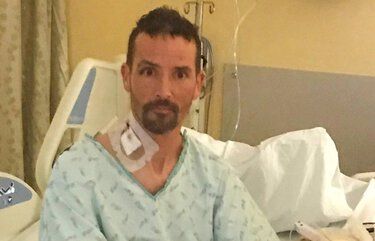It took dozens of park rangers, searchers, doctors and nurses, but Michael Knapinski, who became lost amid freezing, whiteout conditions in Mount Rainier National Park last weekend, was brought back to life in what his medical team is calling a miraculous recovery.
The 45-year-old from Woodinville was on a snowy hike with a friend on the morning of Nov. 7. The two separated below the Muir Snowfield. His friend planned to continue on skis to Camp Muir while Knapinski snowshoed down toward Paradise, where they expected to meet up.
“I was pretty close to the end (of the trail). … Then it turned to whiteout conditions, and I couldn’t see anything,” Knapinski told The Seattle Times in a phone interview Friday. The last thing he said he remembers is taking baby steps down the mountain, surrounded by white.







